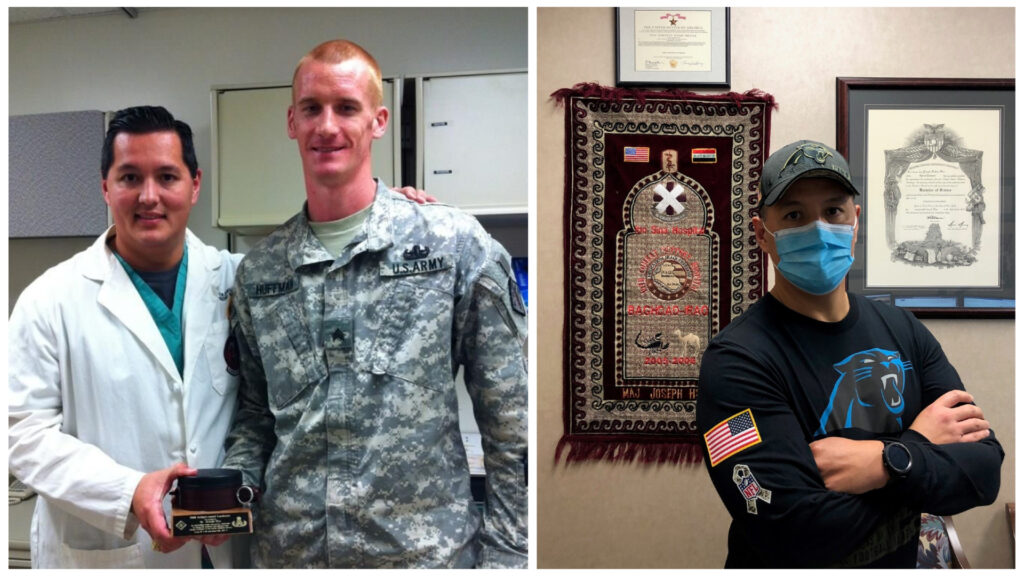Atrium Health’s Dr. Joseph Hsu, a Veteran and West Point Grad, Joins Carolina Panthers’ ‘Salute to Service’

By DERON SNYDER (as published by Atrium Health)
Joseph Hsu, MD, has a keen understanding of our veterans’ contributions to society. He graduated from the United States Military Academy at West Point. He then went on to serve in Iraq during some of American troops’ fiercest encounters with enemy forces. He has used his training and skill to help numerous veterans recover from their injuries. Through his dedicated years of service, he was even awarded the Bronze Star Medal – the fourth highest ranking award a service member can receive for a heroic and meritorious deed performed in conflict.
Dr. Hsu also sees a connection that perhaps many may overlook: the medical advances that civilians can enjoy as a result of veterans’ sacrifices. He thinks about it often, especially during the “NFL Salute to Service” campaign, which the Carolina Panthers will celebrate on Nov. 15 when they honor him and host the Tampa Bay Buccaneers.
“We are proud of our longstanding partnership with the Carolina Panthers and honored to celebrate and recognize members of the military as part of the NFL’s Salute to Service. Atrium Health is committed to extending appreciation to those who have previously served and those who are currently serving our country,” says Claude T. Moorman III, MD, president at Atrium Health Musculoskeletal Institute.
“I couldn’t be more honored to be part of ‘Salute to Service,’” says Dr. Hsu, an orthopedic surgeon who serves as vice chair of quality at Atrium Health Musculoskeletal Institute and director of the limb lengthening and deformity program. “The Panthers have been very involved in veterans’ affairs and I’ve been fortunate to be part of that.
“The team has been instrumental in raising money and supporting the Veterans Bridge Home,” he says. “This is a pro sports team that’s really dedicated to vets’ issues. The Panthers put their money where their mouth is.”
WARRIORS IN AND OUT OF BATTLE
Among Dr. Hsu’s patients is Ben Breckheimer, an Army veteran who in 2009 suffered a debilitating injury in Afghanistan that led to multiple limb salvage surgeries among other procedures. But the Purple Heart-recipient didn’t let injuries stop him from becoming a renowned mountaineer who has climbed all but one peak in the fabled “Seven Summits.”
Another patient is Ryan Hendrickson, a Green Beret who in 2010 stepped on a mine in Afghanistan and subsequently underwent 28 surgeries to save his right leg from amputation. He returned to Afghanistan less than two years later and deployed there several times afterward, eventually receiving the Silver Star.
Dr. Hsu says patients like Hendrickson and Breckheimer helped pave the way for civilians recovering from catastrophic injuries to their limbs, including quarterback Alex Smith of the Washington Football Team. “Those wounded warriors demanded high-level function,” Dr. Hsu says. “They wanted to climb mountains and go back to war, do high-level things. They pushed us.”
‘NORMAL’ ISN’T ENOUGH
For veterans like that, it’s not enough to simply retain their limbs and resume relatively normal lives. So, physicians must push through bounds of creativity to meet their patients’ expectations. And that’s exactly what Hsu and his teammates are doing.
“The latest example and probably the thing we’re most excited about is osseointegration,” Dr. Hsu says. “It’s really blurring the lines between man and machine. When an amputation isn’t going well and a patient has trouble walking and functioning, now we’re attaching the prosthetic right to their skeleton. We put a piece of metal into the bone and the latch the prosthetic onto it.”
Dr. Hsu traveled to Walter Reed National Military Medical Center on numerous occasions to train with the world’s leading experts on osseointegration, limb lengthening, and deformity. About a year ago, he helped launch the program at Atrium Health Musculoskeletal Institute, which quickly has become a national leader in the field.
“People are coming from everywhere,” he says. “It’s another great example of something that came from the horrors of war, but actually is making medical care better.”
TWO SCOOPS: MEDICINE AND THE MILITARY
Dr. Hsu says he wanted to be in medicine since he was child, an interest based on science but also a passion for service.
That partially explains the decision to attend West Point as a 17-year-old pre-med/nuclear engineering major. Up to 2 percent of each graduating class may enter medical school directly from West Point and he made the cut, attending Tulane University of Medicine.
While stationed at William Beaumont Army Medical Center, in El Paso, Texas, Dr. Hsu deployed to Iraq in 2006. This was during an era of sectarian violence that led to “The Surge,” which produced some of the war’s highest casualty rates.
“I was fully trained formally, but the learning and training was just about to begin,” he says. “No amount of training in the civilian sector gets you ready for what happens in war.
“Some of these things you carry with you forever,” Dr. Hsu says. “For me, they were transformative. They’re things that really push and challenge you to innovate, develop, and get techniques going. The protocols, rehab, and pathways that now are incorporated in the civilian world were borne out of wounded warriors.”
He’s excited to have another opportunity to celebrate “Salute to Service” with the Panthers. He attends several games each season and has “all the gear.” He’s especially pleased to wear team attire with accents near and dear to his heart.
“I like the digital camouflage,” he says. “That what I wore when we deployed but the military has moved away from it. But I love it.”
He also loves his service, as a veteran and as a medical professional.
Safe to say the feeling is mutual.
 Follow
Follow
